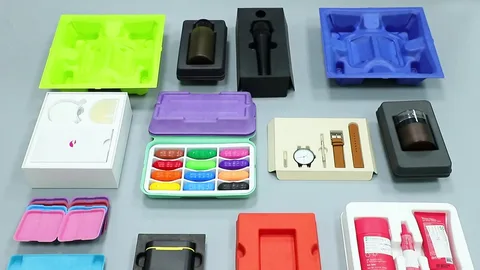Molded packaging has emerged as a crucial element in packaging solutions across multiple industries. Its versatility, sustainability, and cost-effectiveness make it a preferred choice for companies looking to enhance the safety, efficiency, and appeal of their products. From food and beverages to electronics and pharmaceuticals, molded packaging provides a tailored approach to protecting products while meeting regulatory and consumer demands. In this article, we will explore the diverse applications of molded packaging and how it has revolutionized various sectors.
The Basics of Molded Packaging: Materials and Manufacturing
Molded packaging refers to packaging solutions made from materials that are shaped or formed into a specific mold, often to fit the exact contours of the product it is meant to protect. These materials can range from paper pulp, expanded polystyrene (EPS), polyethylene, and biodegradable substances. The manufacturing process typically involves heating a raw material and molding it into the desired shape using a press or a mold. This method is not only efficient but also allows for high customization, ensuring that molded packaging meets the exact specifications of different products.
The materials used in molded packaging are designed to be lightweight, durable, and in some cases, biodegradable, which contributes to its eco-friendly appeal. For instance, molded pulp packaging, made from recycled paper, is both biodegradable and recyclable, making it an environmentally responsible choice. On the other hand, molded plastic packaging offers increased durability and flexibility, often used for more robust applications. As sustainability becomes a more pressing concern, industries are increasingly leaning toward biodegradable or recyclable molded packaging to align with environmental standards and reduce waste.
Molded Packaging in the Food and Beverage Industry
In the food and beverage industry, molded packaging is instrumental in protecting products during transit while ensuring they reach consumers in optimal condition. Custom-designed trays, containers, and inserts molded to the exact shape of food items prevent breakage and spoilage. The use of molded packaging in this sector also allows for greater convenience, as the packaging can be designed to fit multiple units, such as beverages, snacks, and frozen foods.
One of the primary benefits of molded packaging for food and beverage companies is its ability to meet stringent hygiene standards. Materials used in molded packaging are food-safe and can be engineered to prevent contamination. For example, molded pulp trays used for eggs or fruit are not only protective but also ensure ventilation to maintain the freshness of perishable goods. Moreover, molded packaging’s lightweight nature helps reduce shipping costs, making it an economically viable solution for large-scale food producers looking to distribute their products globally.
The Role of Molded Packaging in Electronics and Consumer Goods
Molded packaging plays a crucial role in safeguarding delicate electronics and consumer goods during shipping and storage. Items such as mobile phones, tablets, and computers require packaging that can absorb shock, resist impacts, and prevent scratches. Molded packaging can be designed to cradle and protect these fragile products, providing a custom fit that reduces movement and minimizes the risk of damage. For example, molded foam inserts are often used in packaging for electronics, offering cushioning and insulating properties that ensure safe transit.
Additionally, molded packaging for consumer goods extends beyond just protection—it enhances the unboxing experience. As e-commerce continues to thrive, packaging has become an essential component of brand identity and consumer satisfaction. Molded packaging can be customized with logos, colors, and shapes that elevate a product’s aesthetic appeal, giving businesses an opportunity to stand out. This versatility in both function and design makes molded packaging an indispensable tool for companies in the electronics and consumer goods sectors.
Molded Packaging in Pharmaceuticals and Healthcare
The pharmaceutical and healthcare industries rely on molded packaging for both product protection and regulatory compliance. Medicine and medical devices need to be carefully packaged to ensure that they remain sterile, tamper-proof, and safe for use. Molded packaging, such as blister packs, pill trays, and device housings, provides a secure and controlled environment that extends the shelf life of pharmaceutical products while maintaining their efficacy.
In addition to its protective features, molded packaging for pharmaceuticals often incorporates specific requirements, such as child-resistant closures or moisture barriers. The customization of molded packaging allows for precision, meeting the various standards set by health authorities across different regions. Moreover, as the demand for eco-friendly packaging in the healthcare sector rises, manufacturers are increasingly turning to molded pulp and other sustainable materials to reduce the environmental impact of pharmaceutical packaging.
Sustainable Advantages and Future Trends in Molded Packaging
As sustainability becomes a top priority for businesses and consumers alike, molded packaging is emerging as a leading solution due to its environmentally friendly attributes. Materials like molded pulp, which is made from recycled paper, offer a biodegradable and recyclable alternative to traditional plastic packaging. In addition, the lightweight nature of molded packaging reduces the carbon footprint associated with transportation, contributing to a more sustainable supply chain.
Looking to the future, the trend toward sustainable molded packaging is expected to intensify, with innovations in materials and production techniques. For instance, biodegradable molded packaging made from plant-based materials or waste byproducts is being explored to further reduce environmental impact. As companies continue to prioritize sustainability, the versatility of molded packaging will be central to driving packaging innovations that meet both consumer expectations and regulatory requirements, ensuring its continued growth across various industries.
In conclusion, molded packaging is a versatile and dynamic solution with wide-reaching applications across industries such as food and beverages, electronics, pharmaceuticals, and healthcare. Its ability to protect, preserve, and present products while offering sustainability benefits makes it an essential part of modern packaging strategies. As industries continue to evolve, molded packaging will remain a pivotal component of efficient and environmentally responsible product packaging, driving innovation and helping businesses meet the demands of a rapidly changing market.
